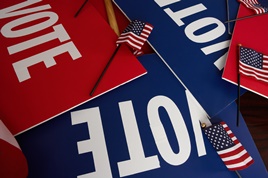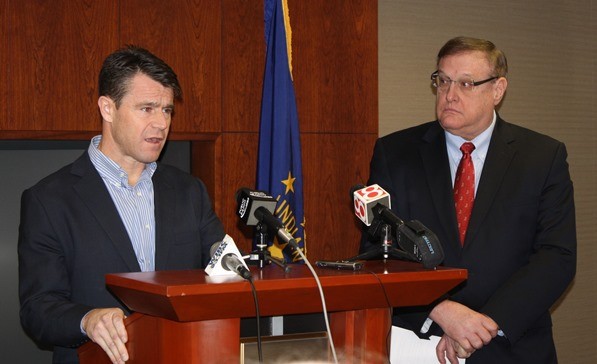 The Governor and General Assembly have continually heard from Hoosier employers on the need for a skilled workforce – and better aligning state programs with job demand. The good news is bills are being introduced to address those concerns. While only a handful of measures have been released to date, we are seeing legislation related to training tax credits and grants, as well as efforts to streamline current workforce programs. We anticipate a comprehensive workforce bill (1002) will be introduced in the House later next week.
The Governor and General Assembly have continually heard from Hoosier employers on the need for a skilled workforce – and better aligning state programs with job demand. The good news is bills are being introduced to address those concerns. While only a handful of measures have been released to date, we are seeing legislation related to training tax credits and grants, as well as efforts to streamline current workforce programs. We anticipate a comprehensive workforce bill (1002) will be introduced in the House later next week.
The Governor’s computer science bill (SB 172) requires all public schools to offer a one-semester elective computer science course at least once each school year to high school students. We expect a hearing on this measure in the next two weeks. Both this and the workforce efforts are 2018 Indiana Chamber legislative priorities.
Senate Bill 257 has been introduced by Sen. Travis Holdman (R-Markle) to serve as the beginning of discussions on clarifying the exempt status of computer software sold as a service (SaaS) – a Chamber priority. Holdman is also authoring another major piece of tax legislation, SB 242, which contains a variety of tax matters. The House bills are coming in too, with a good number already filed addressing local tax issues.
Speaking of local matters, the Chamber is very pleased to see that the House Republican agenda includes a bill that will make township government more effective and efficient by the merging of townships (approximately 300) where less than 1,200 people reside. Such local government reform has been a longstanding Chamber goal.
In addition to SB 257, other technology-related bills include Rep. Ed Soliday’s (R-Valparaiso) autonomous vehicle (AV) proposal to position Indiana to safely test and implement AV technology with automobiles. The bill also will address truck platooning, which uses GPS and WiFi technology to allow trucks to more closely follow each other for greater efficiency, on Indiana roads.
Rural broadband, high-speed internet and small cell wireless structures technology all will be topics for the Legislature to debate. Certified technology parks also will be discussed with the idea to have an additional capture of sales and income tax revenue for those complexes that perform well.
In health care, enabling employers to ask prospective employees if they are smokers not only heads the Chamber’s wish list but also appears to be gaining traction this go-round. Eliminating the special protections (currently in state statute) for smokers is found in SB 23 and will be guided by Sen. Liz Brown (R-Fort Wayne). The bill has a pretty good chance of getting a hearing in the Senate – which would be a first. Previously, a measure was taken up in a joint hearing in the House.
Increasing the tobacco tax and raising the legal age for smokers to 21 are policies that likely will be included in a bill to be introduced by Rep. Charlie Brown (D-Gary). The Indiana Chamber is supportive of both.
Nine utility-related bills are on our radar screen at this point. They range from tweaks of last year’s big legislation (like SB 309, which addressed rising energy costs and a long-standing struggle between the investor-owned electric utilities and larger consumers of energy) to compulsory sewer connection, excavation for infrastructure, regulation of solar energy systems in homeowners’ associations and new water legislation. Separately, Sen. David Niezgodski (D-South Bend) has a proposed ban on coal tar pavement sealer, which we oppose.
There are also a number of bills proposing changes to Indiana’s alcohol laws including: Sunday sales, cold beer sales by grocery and convenience stores, and increases in fees and penalties.
 The Chamber will be providing more details on all of these bills as the session progresses.
The Chamber will be providing more details on all of these bills as the session progresses.
For anyone who wants a refresher about how legislation becomes law, the Chamber has a handy guide free of charge. It includes a diagram of the bill process, a glossary of often-used terms and a look at where bills commonly get tripped up.
Additionally, the Chamber will be providing updates and issuing pertinent documents throughout the session at www.indianachamber.com/legislative.


 The Governor and General Assembly have continually heard from Hoosier employers on the need for a skilled workforce – and better aligning state programs with job demand. The good news is bills are being introduced to address those concerns. While only a handful of measures have been released to date, we are seeing legislation related to training tax credits and grants, as well as efforts to streamline current workforce programs. We anticipate a comprehensive workforce bill (1002) will be introduced in the House later next week.
The Governor and General Assembly have continually heard from Hoosier employers on the need for a skilled workforce – and better aligning state programs with job demand. The good news is bills are being introduced to address those concerns. While only a handful of measures have been released to date, we are seeing legislation related to training tax credits and grants, as well as efforts to streamline current workforce programs. We anticipate a comprehensive workforce bill (1002) will be introduced in the House later next week. The Chamber will be providing more details on all of these bills as the session progresses.
The Chamber will be providing more details on all of these bills as the session progresses.

 It’s been a busy week for Republicans wanting to challenge Sen. Joe Donnelly for his seat. The number now stands at six.
It’s been a busy week for Republicans wanting to challenge Sen. Joe Donnelly for his seat. The number now stands at six.
 At a series of press conferences Aug. 29, the Indiana Chamber reaffirmed its endorsement of Congressman Todd Young (R-IN, 9th District) for the U.S. Senate. The announcement was first made at the Associated Builders and Contractors training facility on the east side of Indianapolis, followed by stops in South Bend and Fort Wayne.
At a series of press conferences Aug. 29, the Indiana Chamber reaffirmed its endorsement of Congressman Todd Young (R-IN, 9th District) for the U.S. Senate. The announcement was first made at the Associated Builders and Contractors training facility on the east side of Indianapolis, followed by stops in South Bend and Fort Wayne. The Indiana Chamber is endorsing Congressman Todd Young (R-IN, 9th District) in his candidacy for the U.S. Senate. The announcement was made today at a press conference at Indiana Chamber headquarters in downtown Indianapolis.
The Indiana Chamber is endorsing Congressman Todd Young (R-IN, 9th District) in his candidacy for the U.S. Senate. The announcement was made today at a press conference at Indiana Chamber headquarters in downtown Indianapolis.